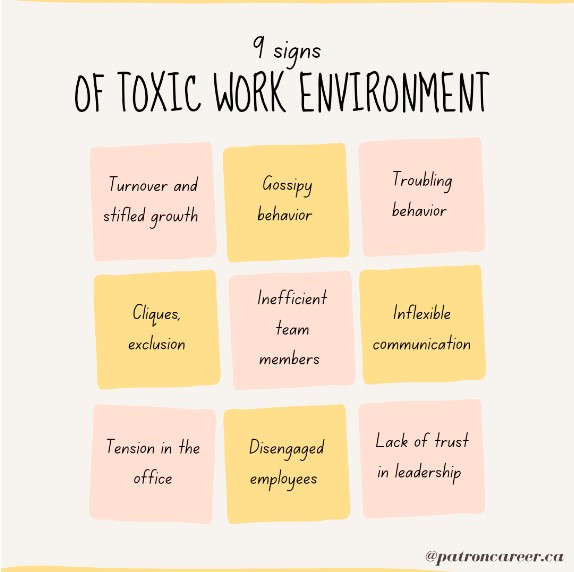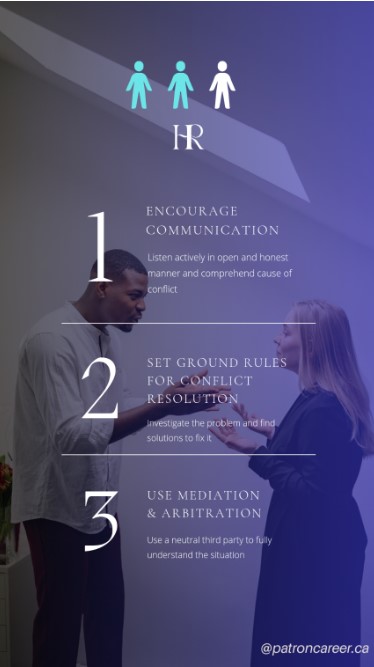
Workplace hazards
27 March, 2023
Patron Career Staffing firmly believes in adopting a tailored approach to meet temporary and permanent recruitment needs. We safeguard the interest of our clients by finding such workers who are knowledgeable and reliable.
About UsNeed help? Make a Call
32 Dundas Street East Unit A, L5A1W2

As an HR professional, you have an ardent responsibility to counter negative emotions and even co-workers when it comes to maintaining the success of your organization. So, to minimize workplace negativity, you need to understand the sources of it. The most crucial step to minimize negativity is to recognize all underlying factors.
Are people feeling negative because they don't feel like their co-workers are supportive? Or do they feel like their workload is too heavy? Is there some other reason that's causing a steep drop in employee morale?

Once you've pinpointed what's causing your employees' negativity, try examining how it's being expressed by looking at how often people complain about things or make negative comments about others. You might also want to consider which teams seem most affected by this kind of behavior--and why they might be more susceptible than others. Do not be ignoramus and read our blog below to find out how you can diagnose workplace negativity and give a positive touch to your organizational culture again:
1. Communicate Openly and Honestly
You need to open up and make the workplace a comfortable place to be. Encourage open communication and dialogue, share lessons and instructive stories. Address issues in a timely manner, and provide feedback and recognition when appropriate. This can help to ensure that employees feel heard, appreciated and valued by their supervisors or managers.
2. Set Clear Expectations
The second step in minimizing workplace negativity is to set clear expectations. This can be done by defining roles and responsibilities, establishing goals and objectives, and setting measurable outcomes.
You have to clearly define what each person's role is within your organization. For example: "I am responsible for X task." If you have multiple teams working on projects together, make sure they understand what their specific contributions are so they don't feel like they're doing more than their fair share of work or being left out completely.
The next step is establishing goals for yourself and others at work- -and then making sure those goals are achievable! It's important not only that everyone knows what needs done but also how much time it will take them (and others) to complete these tasks so that everyone feels like they're moving forward at an appropriate pace towards achieving those objectives together as part of a cohesive team unit rather than competing against one another or feeling isolated from one another due solely because no one has been told where exactly things stand in terms of progress being made towards reaching those specific outcomes together again within this larger context where multiple people may have different ideas about what success looks like based off personal experiences outside work environments which may differ greatly depending upon individual backgrounds/experiences etc...
3. Foster a Positive Work Environment
If you want to learn more about role of teams and how they are incidental to organizational success, you should give our blog a read, here!
4. Provide Support and Resources
You can also help your employees by providing training and development opportunities, investing in the right tools and technology, and making sure they have access to mental health resources.
If you want to be a more positive workplace leader, it's important that you're aware of what motivates your employees. Patron Career Staffing has some great tips on how to do this!
5. Foster Respect and Inclusion
To minimize workplace negativity , we recommend fostering respect and inclusion. PCS has compiled some useful tips that every business owner can follow and implicate around the workplace.
Encourage diversity and inclusion. Diversity is an importantpart of any workplace, but it's especially crucial for the success of your company. If everyone comes from similar backgrounds or experiences, they might not understand each other's needs or viewpoints--and that can lead to conflict down the road! Make sure that you're hiring people who come from diverse backgrounds; this will help create an environment where everyone feels welcome and appreciated for their differences in opinion.
Respect differences in opinion among co-workers as well as clients/customers/etc., even if those opinions differ from yours (or may seem silly). You never know what someone else has gone through or what they're going through right now; therefore, it's important not only that we listen when others speak but also try our best not judge them based on what we think about their situation instead of actually listening carefully enough so we truly understand where they're coming from before making any judgments ourselves.
6. Promote Work-Life Balance
The more you can help your employees balance their work and personal lives, the happier they'll be. This can mean anything from flexible scheduling to encouraging breaks and vacations to providing support for remote work.
PCS confides in workplace flexibility thereby providing job seekers with flexible working arrangements and remote work options to choose from!
7. Implement Conflict Resolution Strategies

8. Monitor Progress and Performance
It's important to monitor your employees' progress, as well as their performance. You can do this by tracking performance indicators such as quality of work, absenteeism, turnover rate and other metrics that are specific to your industry or organization. Also keep an eye on how well they're working together with others in the office--this will help you identify any potential issues before they become too serious. If there is a problem with one of your employees' performance or behavior, address it immediately so that it doesn't get out of hand later on down the line (and potentially affect morale).
9. Create an Open-Door Policy
You can also create an open-door policy. This is a commendable way to encourage employees to speak up about issues, as well as provide them with a safe space in which they can do so. It's important that you offer support and resources, as well as make it clear that you're willing to listen if someone wants advice or just needs someone else who understands what they're going through.
